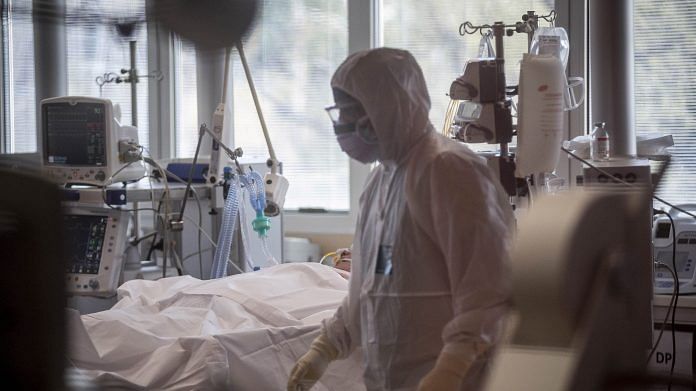London: Speed isn’t the only thing that matters in the quest for a vaccine to end the Covid-19 pandemic.
They may not cross the finish line first, but dozens of companies and universities still see an opening for inoculations that prevent more infections, provide lasting immunity, protect older and more vulnerable people, yield massive quantities or ship easily throughout the world. Those are benefits the front-runners may not be able to deliver.
“Is it the tortoise or the hare?” said Seth Berkley, chief executive officer of Gavi, the Vaccine Alliance, a global non-profit focused on access to immunizations. “There may be a vaccine we start using that isn’t ideal, and we move to a different one later.”
Some of the world’s most prolific and experienced vaccine developers — Sanofi, GlaxoSmithKline Plc and Merck & Co. — are among at least 100 challengers trailing the leaders. While they haven’t begun testing their experimental shots in humans, the companies are emerging as formidable contenders in the race to halt a disease that has infected about 10 million people globally, killing half a million.
“At this stage everything is still on the table,” said Charlie Weller, the head of vaccines at Wellcome, the U.K.-based health research foundation. “There are so many challenges that some candidates could drop out. Therefore we need multiple approaches.”
More than one supplier will probably be needed to make the billions of doses that will required. And some populations may not respond to an initial vaccine, according to Michael Kinch, a drug development expert and associate vice chancellor at Washington University in St. Louis.
“We may end up creating different classes of society, where you have to stay home and you can go out,” Kinch said. “We haven’t even begun to put our arms and brains around what that would mean.”
More than a dozen potential Covid vaccines, including programs led by the University of Oxford and partner AstraZeneca Plc, Moderna Inc., Pfizer Inc. and China’s CanSino Biologics Inc., have started human trials over the past few months. They’re seeking to develop a vaccine in record time, in some cases aiming to provide the initial doses as early as this year.
A few of the leaders, including Moderna, are betting on novel RNA-based platforms that prompt the body’s own cells to make proteins that provoke the immune system to react as if it’s been invaded by a pathogen, training it to defend against the real thing. While these vaccines are quick to make, none such product has yet been licensed for people, and it still isn’t clear whether the first Covid vaccines will protect against infection.
Also read: What doctors know so far about the lingering symptoms of Covid-19
A recent upturn in U.S. cases underscores the need for a reliable weapon to combat Covid-19. Some vaccines advancing at a slower pace are based on tried-and-true methods, like those containing a weakened form of the virus, Gavi’s Berkley said in an interview. Those could be effective in single doses or have other features that make them easier to use.
“You could have a situation where some of the more conventional vaccines, if they provide robust immunity, may be particularly attractive,” he said.
One example is a Merck shot based on an approach that was highly effective in single doses against Ebola and became the first approved inoculation for the virus last year. Expected to enter human tests later this year, the coronavirus version could be part of a longer-term solution.
Merck wants a vaccine “to deal not just with the pandemic, but the endemic phase” if, like other coronaviruses, SARS-CoV-2 becomes established in the human population, CEO Ken Frazier said in an interview.
A couple of months behind Oxford in getting to human tests, Imperial College London is focusing on RNA technology, but with a “self-amplifying” feature aimed at inducing immunity with a much smaller dose.
“I don’t see the first vaccine to be proven to work as the vaccine that necessarily will be the one that’s used most widely,” said Robin Shattock, a professor at Imperial who’s leading development of a shot. He said he hopes to begin a larger study in October.
Rather than developing its own candidate, the U.K. pharmaceutical giant Glaxo is contributing adjuvants — substances that enhance the body’s immune response — to a collaboration with Sanofi and others. That would decrease the amount of vaccine each person needs for immunization, and extend supplies. Sanofi expects to start a study compressing the early and middle stages of clinical trials in September.
The technology could play a key role in protecting the elderly, who are particularly vulnerable to Covid-19, according to Thomas Breuer, chief medical officer of Glaxo’s vaccines unit. Another huge drug company in the second wave of vaccines, Johnson & Johnson, said this month that it will start human trials in the last half of July, about two months earlier than expected.
The company’s goal is to “protect people everywhere from this pandemic,” said Paul Stoffels, J&J’s chief scientific officer.
A successful shot may not accomplish everything that’s needed to conquer the virus, Wellcome’s Weller said, and having a number of vaccines would help immunize a broader swath of people. Rolling out vaccines in hot and remote regions could be complex if they require cold-storage supply chains or multiple doses, she said.
With the candidates out front “some will fail, and maybe one or two will succeed,” said Breuer, the Glaxo vaccine executive. “We shouldn’t assume the fastest is always the best in terms of longer-term value.” -Bloomberg
Also read: Not just key data, but US’ Covid fatality rate could be missing the big picture



